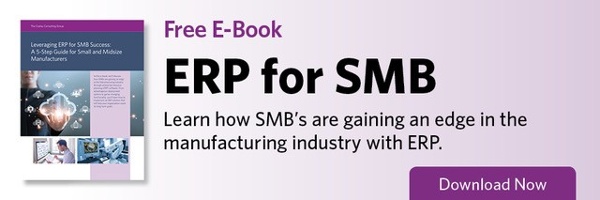In this special blog series, ERP for Small and Midsize Manufacturers, we'll discuss how SMBs are gaining an edge in the Manufacturing industry through ERP software. From flexible deployment options to mission-critical functionality, you'll learn what to look for to extend the value and shelf life of your next ERP system.
The priorities of SMB manufacturers differ from industry to industry. The requirements for a medical device manufacturer will be very different from those of a custom shipbuilder.
However, one thing all SMBs require to remain competitive is the ability to pivot – be it for growth opportunities or market changes – as gracefully as the big guys. With an ERP system in place to help automate your workflows, you can streamline your day-to-day processes and position your company to adapt quickly and effectively.
be it for growth opportunities or market changes – as gracefully as the big guys. With an ERP system in place to help automate your workflows, you can streamline your day-to-day processes and position your company to adapt quickly and effectively.
Here are three benefits small and mid-sized manufacturers can gain in utilizing ERP workflow automation tools.
1. Simplified communication.
Communication is key for competitive SMBs. In your company’s early stages, unique project requirements and new workflows may be communicated through lengthy process documents, prolonged email strings or a series of team meetings. But as your operation grows and your capabilities expand, you will find that these solutions are not as effective as they used to be.
Using workflow automation tools in your ERP system helps move processes and process-related conversations to a centralized virtual platform. A given process can be built out step-by-step with notes added along the way. And if something unexpected comes up, the manager has the ability to pause or modify the workflow as part of the resolution. All this lends a new level of posterity, portability and transparency to your operations.
2. A better use of your workforce.
When it comes to the manufacturing business, the actual manufacturing process is only a fraction of the work that goes into delivering a product. Think of all the planning involved, all the handoffs and the checkpoints. What could your company do with all that time dedicated to logistics?
While no ERP system has an auto-pilot setting, ERP software can certainly help SMBs to automate administrative tasks by generating reports, facilitating quality checks and sending task reminders to keep procedures on track. This allows employees to remain organized and spend time on mission-critical tasks that utilize their expertise rather than get on stuck on a to-do list of paperwork and administrative activities.
3. Streamlined operations – and budget.
If you’ve never had an opportunity to step back and deeply analyze your processes, an ERP system is the catalyst to help you do just that. By building out workflows in a step-by-step format, assigning tasks to particular users and creating rules and conditions for certain actions, many manufacturers uncover redundancies in their operations they didn’t know existed.
ERP software is designed to help you make new, more efficient workflows – and stick to them. You’ll know definitively when a task is completed, who completed it and when. You’ll have the numbers in front of you, in real time. No more second-guessing or back-tracking when an unexpected error creeps in. Your ERP system can be configured to know your “normal” and alert you proactively when conditions are out of range. The result? A more streamlined workforce, fewer errors, and thus, a more controlled budget.

